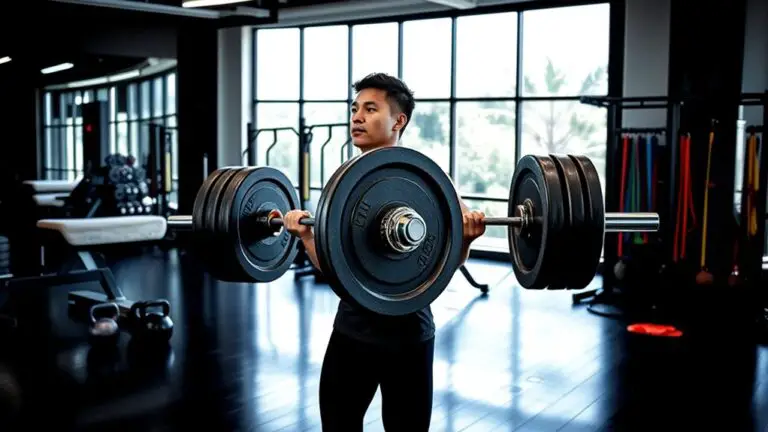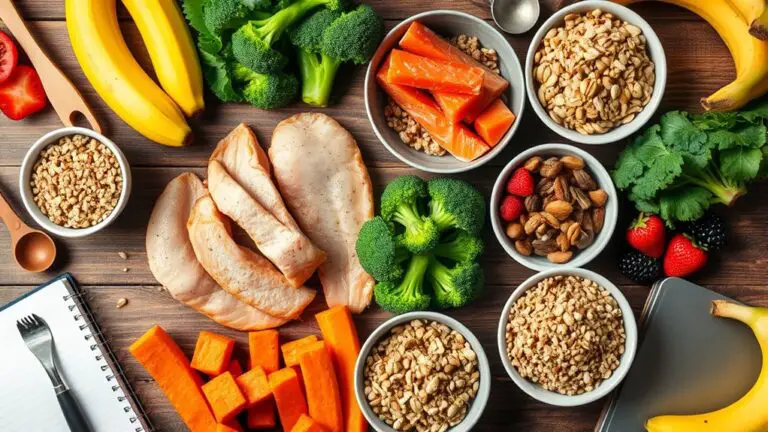The Best Foods to Eat Before Strength Training Sessions
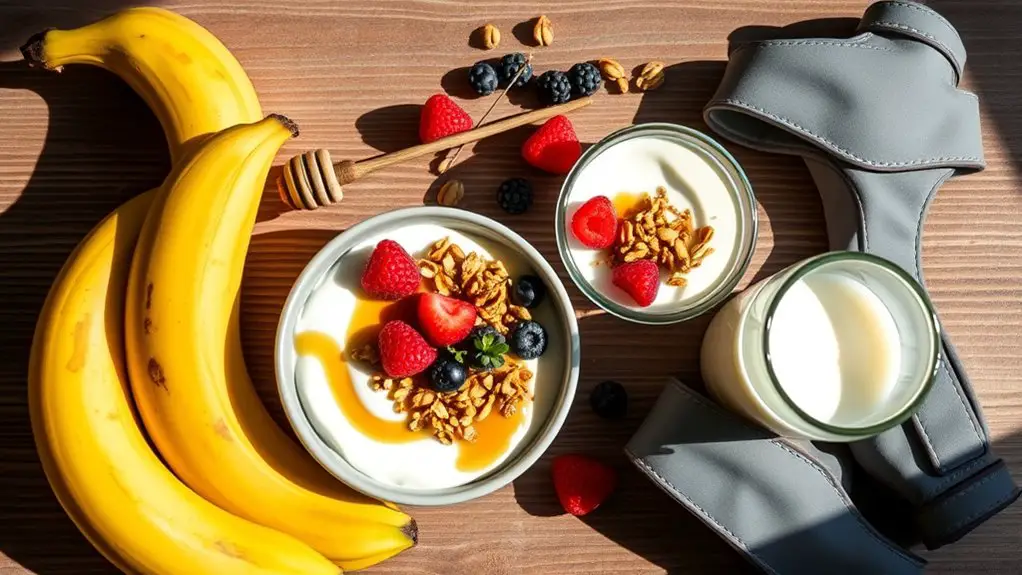
To maximize your strength training performance, focus on a balanced pre-workout meal. Include carbohydrates like bananas or rice cakes for quick energy, and add protein from sources like Greek yogurt or chicken to support muscle repair. Healthy fats, such as those from avocados, provide sustained energy. Don’t forget hydration; drink plenty of water or electrolyte drinks. Timing your meals is essential too. Explore more on optimizing your pre-workout nutrition for the best results.
Importance of Pre-Workout Nutrition

Pre-workout nutrition plays an essential role in maximizing your strength training performance. By focusing on nutrient timing, you can optimize your body’s energy levels and recovery. Consuming the right nutrients before your workout can enhance muscle function and endurance, making it easier for you to achieve your fitness goals.
One of the key pre-workout benefits is improved focus and reduced fatigue, allowing you to push through challenging sets. Incorporating proteins and specific fats into your pre-workout meal can help stabilize blood sugar levels, providing a steady energy supply during your session. It’s vital to eat at the right time—ideally, 30 to 90 minutes before you train—to guarantee your body has the fuel it needs without feeling sluggish.
Carbohydrates: The Energy Source
Carbohydrates are your primary energy source for strength training, and understanding the different types can help optimize your performance. Timing your carbohydrate intake is equally important, as consuming the right amount before your workout can enhance endurance and strength. By focusing on these aspects, you can guarantee that your body is fueled and ready for the demands of training.
Types of Carbohydrates
When you’re preparing for strength training, understanding the types of carbohydrates you consume can greatly impact your performance and energy levels. Carbohydrates fall into two categories: simple and complex. Simple carbohydrates, like sugars found in fruits and honey, provide quick energy but can lead to rapid spikes and drops in blood sugar. On the other hand, complex carbohydrates, such as whole grains and legumes, release energy more steadily, offering sustained fuel for your workout. Including a mix of both can be beneficial. Simple carbs can be useful for an immediate energy boost, while complex carbs help maintain energy throughout your training session. Balancing these types guarantees you’re well-prepared for peak performance during strength training.
Timing Your Intake
To maximize your strength training performance, it’s crucial to contemplate not just what you eat but also when you eat it. Nutrient timing plays a pivotal role in optimizing your energy levels. For best results, consume carbohydrates around your workout sessions. This helps replenish glycogen stores and guarantees sustained energy.
| Meal Timing | Recommended Carbohydrates | Meal Frequency |
|---|---|---|
| 1-2 hours before | Bananas, Oatmeal | 3-4 times daily |
| 3-4 hours before | Brown Rice, Quinoa | 5-6 times daily |
| Post-workout | Protein Shake, Fruit | 3-4 times daily |
| During workouts | Energy Gels, Sports Drinks | 3-4 times daily |
| Throughout the day | Whole Grain Bread | 5-6 times daily |
Focus on meal frequency and timing to enhance your training outcomes.
Protein: Building Blocks for Muscle
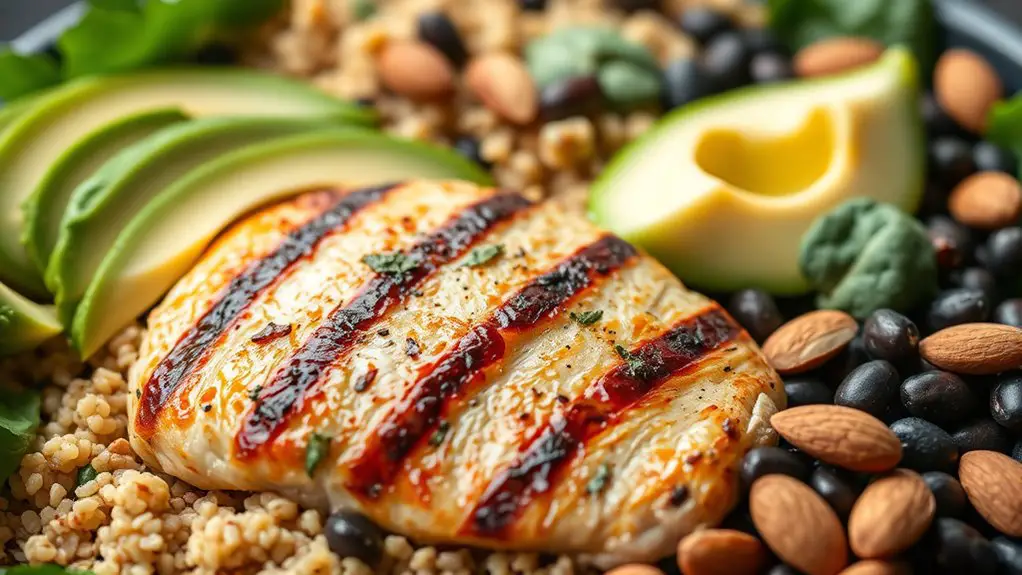
Although many people focus on carbohydrates for energy, protein plays an essential role in muscle repair and growth, making it an important component of your pre-strength training nutrition. Consuming adequate protein before your workout helps provide the building blocks necessary for muscle synthesis. Good protein sources include chicken, fish, eggs, Greek yogurt, and plant-based options like lentils and quinoa.
Protein timing is also significant. It’s best to consume protein within a couple of hours before your workout to maximize muscle recovery and growth. This strategy guarantees that amino acids are readily available during and after your training session. Aim for 20-30 grams of protein, depending on your body weight and goals, to support muscle repair effectively. By prioritizing protein in your pre-workout meal, you’re setting the stage for better performance and muscle gains, ultimately enhancing your strength training results.
Healthy Fats: Sustained Energy Release
Incorporating healthy fats into your pre-workout nutrition can provide sustained energy for your strength training sessions. Understanding the different types of healthy fats, their ideal timing for consumption, and the best food sources can enhance your overall performance. By making informed choices, you can guarantee that your body has the fuel it needs for effective workouts.
Types of Healthy Fats
When you’re preparing for strength training, including healthy fats in your diet can provide a sustained release of energy, which is essential for peak performance. Healthy fats come from various nutrient-dense fat sources, each offering unique benefits. For instance, avocados and olive oil are rich in monounsaturated fats, promoting heart health and stable energy levels. On the other hand, fatty fish like salmon are packed with omega-3 fatty acids, which can aid in recovery and reduce inflammation. Nuts and seeds also contribute healthy fats, providing a combination of fiber and protein that enhances satiety and energy. By incorporating these types of healthy fats into your pre-workout meal, you’ll guarantee that your body has the energy needed for an effective strength training session.
Timing of Consumption
Understanding the timing of healthy fat consumption can significantly impact your strength training performance. Incorporating healthy fats into your meals can provide sustained energy release, but you need to take into account digestion time. Fats take longer to digest compared to carbohydrates and proteins, so consuming them too close to your training session might lead to discomfort. Ideally, you should aim for a meal containing healthy fats 1.5 to 3 hours before your workout. This allows sufficient time for digestion while still benefiting from the energy provided. Additionally, meal frequency plays a role; spreading your fat intake throughout the day can help maintain energy levels and support overall performance during strength training. Timing and balance are essential for best results.
Recommended Food Sources
Healthy fats play an essential role in providing sustained energy for your strength training sessions. Incorporating them into your pre-workout meal can enhance nutrient density and promote food variety, ensuring you have the fuel needed for ideal performance. Here are some excellent sources of healthy fats to take into account:
| Food Source | Nutritional Benefits |
|---|---|
| Avocado | Rich in monounsaturated fats |
| Nuts (e.g., almonds) | High in omega-3 fatty acids |
| Olive oil | Contains antioxidants |
| Chia seeds | Packed with fiber and protein |
| Fatty fish (e.g., salmon) | Supports muscle recovery |
Including these options in your diet can help you maintain energy levels during workouts and contribute to overall health. Choose wisely for the best results!
Hydration: The Key to Performance
While many focus on the foods consumed before strength training, hydration often plays a more vital role in optimizing performance. Staying hydrated helps maintain your strength, endurance, and overall workout efficiency. It’s important to develop effective hydration strategies tailored to your body’s needs. Aim to consume fluids throughout the day, rather than just before your workout, to guarantee you’re adequately hydrated.
Don’t fall for common hydration myths, like the idea that you only need to drink when you’re thirsty. Thirst can be an unreliable indicator of your hydration status, especially during intense sessions. Instead, monitor the color of your urine—pale yellow typically indicates good hydration. Before your workout, consider drinking around 16-20 ounces of water or a low-sugar electrolyte beverage to optimize your performance. Remember, proper hydration is just as important as the food you eat, so make it a priority in your training regimen.
Timing Your Pre-Workout Meal

When it comes to maximizing your strength training results, the timing of your pre-workout meal can make a significant difference. Ideally, you should aim to eat a balanced meal containing carbohydrates and protein about 2 to 3 hours before your workout. This allows your body enough time to digest the food and convert it into usable energy. However, meal frequency and individual preferences play an important role in this timing. If you prefer smaller meals throughout the day, a snack about 30 to 60 minutes before training can also be effective, as long as it’s rich in carbs and moderate in protein. Remember, each person’s digestive system is different, so it’s essential to find what works best for you. Experiment with different timing strategies and meals to determine how they impact your energy levels and performance during strength training sessions.
Quick and Easy Pre-Workout Snacks
Finding the right pre-workout meal is important, but sometimes you need something quick and easy that won’t weigh you down. Here are some snack ideas that are both nutritious and efficient for fueling your strength training sessions.
A banana with a tablespoon of almond butter provides a perfect blend of carbohydrates and healthy fats, giving you energy without feeling heavy. Greek yogurt topped with a handful of berries is another quick recipe, offering protein and antioxidants for muscle recovery.
If you’re short on time, try a small protein shake made with water or milk, combined with a scoop of your favorite protein powder. Alternatively, rice cakes spread with avocado or cottage cheese are light yet satisfying options.
These snacks are designed to be easily digestible, helping you maintain energy levels without compromising your workout performance. Choose what works best for you to optimize your training experience!
Foods to Avoid Before Training
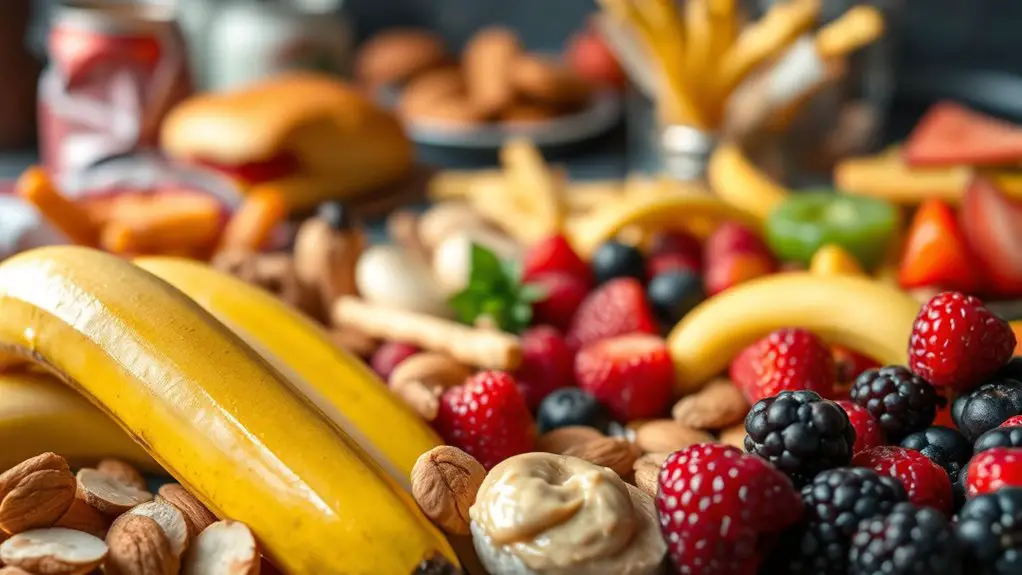
Certain foods can hinder your performance during strength training, so it’s crucial to be mindful of what you consume beforehand. Here are some foods to avoid to prevent digestion issues and enhance your workout:
| Food Type | Reason to Avoid | Alternative Choices |
|---|---|---|
| High Fat Foods | Slow digestion, may cause discomfort | Lean proteins, nuts |
| Heavy Meals | Can lead to sluggishness | Light, balanced snacks |
| Sugary Snacks | Spike in blood sugar, energy crash | Fruits, whole grains |
| Caffeine Intake | Excess can cause jitters | Moderate amounts, herbal tea |
| Spicy Foods | May cause gastrointestinal distress | Mild seasonings |
| Dairy Products | Potential for bloating | Lactose-free options |
| Processed Foods | Low nutritional value | Whole foods |
| Alcohol Consumption | Impairs recovery and hydration | Water or electrolyte drinks |
Staying clear of these options will help guarantee a more effective training session.
Personalizing Your Pre-Workout Nutrition
To optimize your strength training, personalizing your pre-workout nutrition is essential, as individual needs can vary greatly. Factors such as your body composition, workout intensity, and individual preferences play a critical role in determining what foods will best fuel your performance. For instance, if you have a higher muscle mass, you might require more carbohydrates to sustain energy levels during intense lifting sessions.
Experimenting with different food combinations can help you identify what works best for you. You might find that a balance of protein and carbs, like Greek yogurt with fruit, provides the energy you need without feeling heavy. Additionally, consider the timing of your meals—eating too close to your workout may lead to discomfort, while eating too early might leave you feeling depleted. Ultimately, listening to your body’s signals and adjusting your nutrition accordingly will enhance your training results and overall performance.
Frequently Asked Questions
Can I Eat a Large Meal Before Strength Training?
You can eat a large meal before strength training, but timing and meal size considerations are essential. Ideally, you should wait about 2-3 hours after a large meal to allow for digestion. Eating too close to your workout might lead to discomfort or sluggishness. If you prefer a larger meal, make sure it’s balanced with carbohydrates, protein, and healthy fats to fuel your workout effectively while minimizing any potential digestive issues.
What Are the Best Pre-Workout Foods for Vegetarians?
When considering the best pre-workout foods for vegetarians, focus on protein sources like legumes, quinoa, and tofu to guarantee adequate muscle support. Nutrient timing’s vital; consuming these foods about 30 to 60 minutes before your workout can optimize energy levels and performance. Pairing carbohydrates with protein, such as a smoothie with spinach and protein powder, can enhance recovery and sustain endurance. This balanced approach can help you maximize your strength training sessions effectively.
How Do Food Allergies Impact Pre-Workout Nutrition?
Food allergies can greatly impact your pre-workout nutrition, affecting both allergy management and nutrient absorption. If you’re allergic to certain foods, you might need to avoid them, which can limit your options. This restriction may lead to deficiencies in essential nutrients that fuel your workouts. Balancing your diet while ensuring you get adequate energy and nutrients can be challenging, but it’s vital for peak performance and overall health.
Should I Consider Meal Replacements as Pre-Workout Snacks?
When considering meal replacements as pre-workout snacks, you should focus on nutritional balance. Meal replacements can provide essential nutrients and energy, making them convenient. However, not all options are created equal; some may lack important components or contain excessive sugars. It’s essential to choose a meal replacement that aligns with your dietary needs and supports your workout goals. Always make sure it complements your overall nutrition plan for best performance and recovery.
Can I Drink Coffee Before My Strength Training Sessions?
You might find that a little cup of joy can work wonders before your strength training sessions. Caffeine benefits include increased energy and focus, which can enhance performance. However, it’s essential to remember hydration’s importance; coffee is a diuretic, so you’ll want to balance it with water. If you enjoy that morning brew, just be mindful of portions and listen to your body’s cues to optimize your workout experience.
